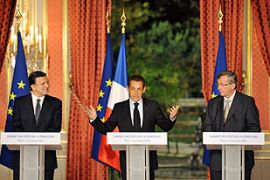Mixed response to Eurozone rescue
Some Asian markets higher on package guaranteeing inter-bank lending and recapitalising banks.

Kevin Rudd, the Australian prime minister, also guaranteed the borrowings of Australian banks in international credit markets and doubled to A$8bn a scheme to purchase residential mortgage-backed securities to shore up the mortgage market.
Share prices in South Korea and Singapore were also higher on Monday but those in Hong Kong and New Zealand were fluctuating between positive and negative territories while stocks in China and Taiwan were down.
| IN DEPTH | ||
|
|
Japanese markets, which lost 24 per cent last week, were closed for a holiday on Monday.
The stock markets in Asia were the first on Monday to react to news that leaders of European countries using the euro had agreed on a plan to jointly confront the banking crisis by recapitalising banks and guaranteeing inter-bank lending.
Aela Callanm, reporting for Al Jazeera from Hong Kong, said the rescue plan may have been welcome news to some investors, but some Asian economies have problems of their own.
Specifically, China, Taiwan and Hong Kong are all export-dependent economies and there are mounting fears that the sharp downturn in the US and Europe – the major buyers of those exports – will severely reduced exports, profits and jobs in the Asian countries.
Eurozone plan
Unveiling the action plan in Paris on Sunday after a summit of the leaders of the 15-nation Eurozone single currency bloc, Nicolas Sarkozy, the French president, said the countries would unveil the details of their national plans on Monday, but all had agreed on a specific series of measures designed to restore confidence in the economic system.
Leaders did not reveal, however, the total size of the cash engagement implied by their measures for taxpayers across the continent.
The new procedures will be in place until the end of next year, Sarkozy said.
“This is indeed a joint action that we are undertaking. This plan addresses all aspects of the financial crisis.”
Sarkozy said that to do nothing was not an option.
“The crisis has over the past days entered into a phase that makes it intolerable to opt for procrastination and a go-it-alone approach,” he said.
He was careful to say that the measure is “not a gift to banks”.
Before joining his Eurozone colleagues, Sarkozy held bilateral talks with Gordon Brown, the British prime minister, to talk about his plans partially to nationalise some of UK’s banks.
Britain does not use the euro.
Right direction
After briefing the other leaders, Brown said he expected confidence to be restored to the markets in a matter of days.
“I believe that in the next few days confidence in the banking system will be restored,” he said.
“The decisions we take over the next few days will affect us for the years ahead.”
Angela Merkel, the German chancellor, said the measures “will allow markets to start functioning again – that was our aim. It is a strong message to the markets.”
James Henry, an economist, told Al Jazeera that the package was “a step in the right direction” indicating that “policy-makers are finally taking this seriously enough” to come to some consensus.
Though optimistic about the measures announced, he said there needed to be more clarity on what banks’ balance sheets consisted of, the money needed to flow more quickly, and home owners and borrowers needed to be given some debt relief.
Henry added that one of the biggest things missing from the package was “real co-ordination on international regulation”.
Brown’s appearance at the Paris summit came as The Sunday Times newspaper in London said Britain would launch its biggest retail bank rescue on Monday when the four largest banks – HBOS, Royal Bank of Scotland, Lloyds TSB and Barclays – ask for a combined $60.5bn lifeline.
The unprecedented move would make the government the biggest shareholder in at least two banks, HBOS and Royal Bank of Scotland, the newspaper said on its website.
